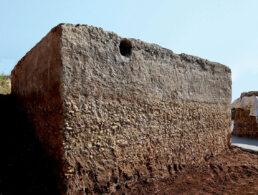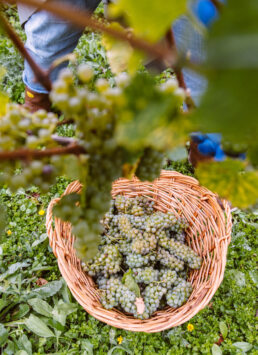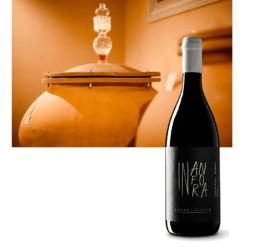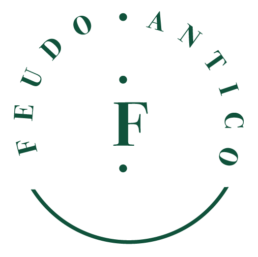Archeo-enology
Italy, Abruzzo, Province of Chieti, Tollo, Località San Pietro. In 2013, during the preparation of the soil for the first replanting of Pecorino, the native grape variety we chose to start our Feudo Antico project, the ruins of a Roma villa rustica came to light. From that moment, our aim to safeguard and enhance the territory has gained more strength and awareness.

2000 years of tradition
A large cistern in heavy opus caementicium, a second, smaller, cistern, an inclined surface as the base of a torcularium, a dolium cell made of 7 dolia housings, an impressive amount of ceramic fragments, an impermeable plaster basin, a fragment of mosaic flooring.
hese are the important findings registered by the local Archaeological Superintendence during the excavations carried out from 2016 to 2021. A productive villa that has lived through various phases of life, starting from the High Imperial Age, probably between the 1st century BC and the 1st century AD, until modern and recent ages: the farmhouse that, until 2019, stood above the cistern can likely be dated between the beginning of the 20th century and the end of the 19th century. During the High Imperial period, the Romansbuilt a farm here to produce the nectars and oils to be offered as libations to the gods. Today, we bring to light the artefacts made by our extraordinary ancestors, and we continue their magnificent work by producing both Bacchus nectar and the “green gold” from the fruit of the Athena tree. Wine and oil have been produced in Tollo for over two thousand years.
Deep-rooted vocation
During World War II, Tollo, which for centuries had seen the constant development of its wine-growing vocation, was seriously damaged.
Near Ortona, which was then the front line of the war, farms and vineyards were destroyed along with the historic centre. Tollo’s farmers did not despair and, immediately after the war, resumed vine cultivation. The hills filled with vineyards once again, and although the population of Abruzzo was emigrating in large numbers, the inhabitants of Tollo chose to stay.


InAnfora
InAnfora follows the Romans' winemaking tradition, which entails very little interventions and the use of very small doses of sulphites.
The discovery of ancient Roman amphorae on our sites led us to retrace this ancient method of winemaking, already mentioned in Plinio’s writings. The already strong appeal of history has thus further sharpened, making our project even more interesting and ambitious.

